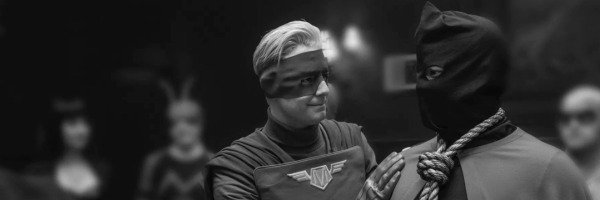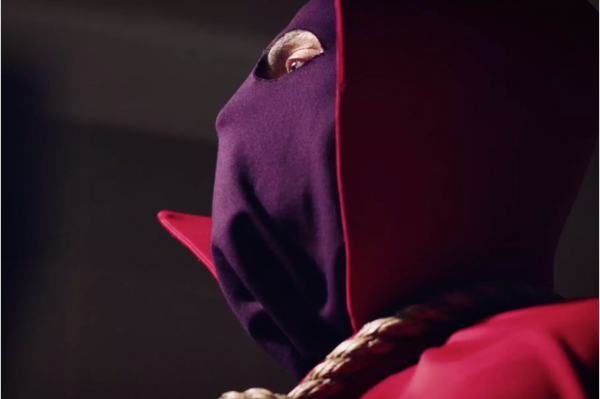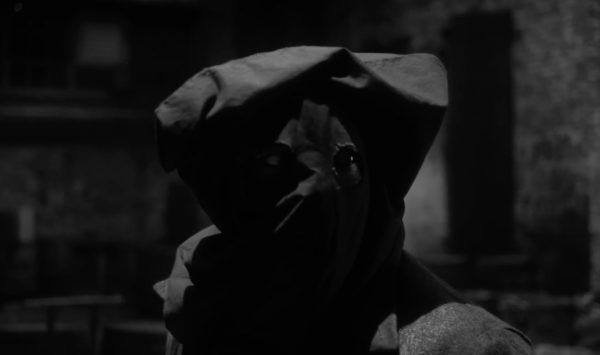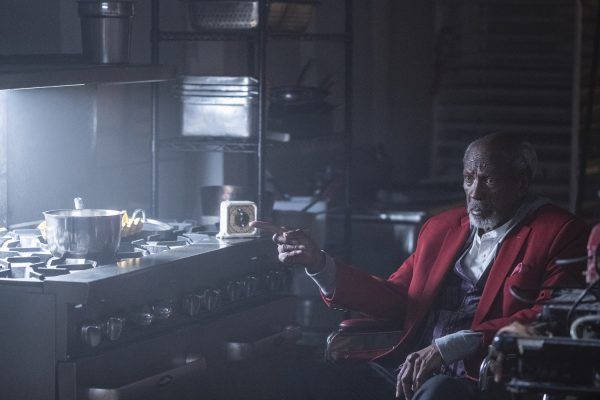Be aware there are spoilers for Watchmen below, through Episode 6.
Watchmen just can't stop blowing minds. The HBO series spends each week digging into the guts of the beloved comic series and reinventing it for a new era. In the sixth episode, titled "This Extraordinary Being," series creator Damon Lindelof and episode writer Cord Jefferson uncover one of Watchmen's great mysteries -- who is Hooded Justice?
The answer was none other than Will Reeves, Angela's mysterious grandfather who claimed to have murdered Tulsa's beloved police chief Judd Crawford. That reveal won't necessarily be a surprise if you've been keeping a close eye on things -- it's been pretty well telegraphed, from Will's costuming to his weapon of choice in killing Judd. But the full extent of his origin story is rich, tragic and cathartic, coming with some mind-bending reveals, especially the fact that a secret white supremacist group known as "Cyclops" was using mind-control mesmerism technology to create black-on-black violence. And that Will used the very same technology to make Judd hang himself.
In the comics, Hooded Justice is the hero who started it all -- the first of the masked vigilantes, who inspired the others into action, and who never ever reveals his secret identity. We know that he had a sexual relationship with Captain Metropolis, and that he's the hero who stopped The Comedian from raping Sally Jupiter, but the details of his identity and why the first-ever hero picked up the mask remain a mystery. In his former co-hero Hollis Mason's autobiography "Under the Hood", the original Night Owl theorizes that HJ might have been a German strongman by the name of Rolf Müller, but HBO's Watchmen tells a very different story.
Speaking with Collider, Lindelof explained that uncovering the true story of Hooded Justice is part of what inspired him to take on the series in the first place:
"That was one of the first ideas I had. I’ve been obsessed with who was Hooded Justice, it was this great unanswered mystery from the original Watchmen and Alan Moore didn’t want it to be answered, and so I had to start with saying the most active piece of hubris I could possibly engage in -- trying to answer who was Hooded Justice. But if I’m going to do that I have to also answer the following question, which is why did he hide his identity? Why was Hooded Justice’s identity kept from us? When all the Minutemen were on a first-name basis with each other; they know that the comedian is Eddie Blake, they call him Eddie; they know that Nelson Gardener is Captain Metropolis, they call him Nelly; they knew that Byron is Mothman, they call him Byron. Why did no one one call Hooded Justice by his first name? Why did they only call him HJ? Why did no-one know who he really was? I have to answer that question satisfyingly."
"And the answer was, what if he was an African American man and he had to hide his identity because you could not be a black superhero in the 1940s? You would literally be murdered if your identity was known. That idea scared the living daylights out of me but I couldn’t shake it, and the entire season was all about trying to pull that off in some authentic way."
Lindelof added,
"I just have to give a tremendous amount of credit to the other writers, particularly Cord Jefferson who on day four — we co-wrote that episode together, but basically pitched Hooded Justice’s origin story whole cloth and we shot it kind of beat for beat. So I’m really proud of the ambition of that episode. Stephen Williams just directed the hell of it, Jovan Adepo, just an incredible central performance for a one-off and Danielle Deadwyler who played June. It was like a pilot in and of itself, announcing and executing that episode."
Indeed, in "This Extraordinary Being" we learn that man is Will Reeves; a survivor of the horrific Tulsa race massacre, who went on to become a police officer in New York City, only to discover that violent racism was waiting for him there too. Angela takes her grandfather's nostalgia pills and falls down a rabbit hole of his traumatic memories, where we learn the hideous truth of what inspired him to put on the hood in the first place. When Will sees a man burn down a Jewish delicatessen, he arrests the criminal only to see him walking free on the streets the next day. And his righteousness is met with violence when his fellow officers beat him, kidnap him, and hang him from a tree.
When they cut him down, Will realizes the Cyclops reaches all the way into the ranks of the law and that, as his wife June tells him, he's not going to get justice from with his badge, he's going to get it with his hood. Walking home from his own lynching, the rope still around his neck and hood in his hands, he wanders down a street where he sees a couple being attacked. That's the night Hooded Justice is born. Will puts the hood back on and protects them, starting his career as a masked vigilante; he wears the hood and paints his eyes white so that society will accept him. And that career eventually leads him to discover that Cyclops is using mind-control technology to incite racist violence. And when he tries to expose the corruption, he's stopped by none other than his lover Captain Metropolis, who snidely tells him “I’m afraid you’ll have to solve Black unrest all on your own."
Will does his part to bring Cyclops down, to stop the mind control, to stop the cycle, but the trauma lives on in his own home too. He finds his son painting his young face white and wearing the hood and Will lashes out at him, driving a wedge between him and his family, and the cycle of generational trauma continues -- something we see play out with Angela's experience on Will's nostalgia was well. That idea, which we heard explained in detail during Episode 5's PTSD group therapy session with Looking Glass, is another key element of Watchmen's themes and it's something that was essential to writer Cord Jefferson, who Lindelof says "pitched Hooded Justice's origin story whole cloth."
As Jefferson explained to Polygon:
"To me, that moment is the moment when Will has to face the reality of his generational trauma, and that he’s handing down his wounds to his progeny in a way that may harm them. He realizes that his life has not become what he wanted it to be, that he’s lying to everyone, that he hasn’t dealt with the trauma, that he hasn’t gotten rid of the hurt and pain and anger he feels about what happened to him when he was younger. He understands that, even if he hasn’t admitted it to himself, he hasn’t been able to get rid of those wounds. Even though he’s killed a warehouse full of racists, it still hasn’t brought back his mother and father, it still hasn’t brought back Greenwood, he’s still suffering. He comes home after doing this thing and sees that his son is becoming exactly what he was, and who he is, and he’s forced to face the idea that he’s just making another person to follow in his footsteps. And he doesn’t like his footsteps."
Watchmen offers us a dark and tragic, but honest and cathartic answer to one of the greatest mysteries in the Watchmen canon -- who is Hooded Justice? He's a victim of the system, who found no comfort in the law and turned to a mask instead, only to find that he wasn't able to find justice that way either. And now, with three episodes left in the series, we know that Will has business with Lady Trieu, that he seemingly has found a new means to pursue that end.
For more on Watchmen, be sure to read what Lindelof told us about what the hell is going on with Adrian Veidt and bringing back Laurie Blake.




